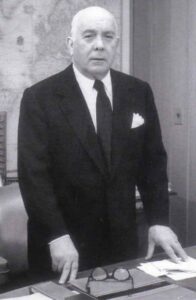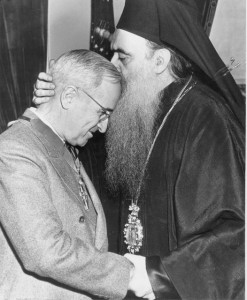In the mid-20th century, the Skouras brothers — Charles, Spyros, and George — were among the most powerful men in the booming film industry. Charles was president of Fox West Coast and funded the construction of St Sophia Greek Orthodox Cathedral in Los Angeles, using his movie star friends as models for the icons. George was head of United Artists Theaters (now Regal Cinemas) and also worked as an agent of the OSS (the precursor to the CIA). But the most influential of them all was Spyros: the back cover of his memoirs (published in 2013) describes him as “the most influential Greek immigrant in American history and one of America’s preeminent citizens during the Cold War period.” Spyros was both the head of Twentieth Century Fox for more than two decades and also President of Prudential Lines, one of the largest shipping companies in the country.
In 1948, at the dawn of the Cold War, Ecumenical Patriarch Maximos V was forced out of his position and replaced by Patriarch Athenagoras, who was previously the Greek Archbishop of North and South America. I’ve written at length about this fascinating episode in church history, using as my main source a set of declassified CIA documents. As I observed in my earlier work, there are conspicuous gaps in the declassified documents, critical periods where no documents are publicly available. Given how closely the CIA followed the Ecumenical Patriarchate, it seems improbable that these documents do not exist; more likely, they simply remain classified.
Recently, I was provided with some additional declassified documents — a trio of letters from Spyros Skouras to then-Vice President Spyro Agnew and President Richard Nixon, written in 1969. In these letters, Skouras offers a firsthand account of the events surrounding Patriarch Athenagoras’s election and enthronement two decades earlier, and he appeals, at Athenagoras’s direction, for additional U.S. intervention in selecting Athenagoras’s successor.
Back in 1948, Spyros Skouras was 55 years old and had taken the helm of Twentieth Century Fox a year earlier. Here his how he described his interactions with U.S. Secretary of State George Marshall in his May 28, 1969 letter to Agnew (which you can download by clicking here):
As I told you, the late General George Marshall, when he was Secretary of State, called me and asked me to give him my opinion of the then Archbishop Athenagoras of North and South America, now Patriarch of Constantinople. General Marshall wanted to recommend that the Archbishop be considered by the Holy Synod of the Greek Orthodox Church in Istanbul for the office of Patriarch of Constantinople.
At the time, both General Marshall and the then President, Harry S. Truman, were apprehensive that there might be elected to this important office of Patriarch of Constantinople of the Greek Orthodox Church a man who would not be aware of the importance of American policies abroad, particularly in Communist Russia and its satellite states which are all at least 90% Greek Orthodox.
There were, and are, over 300,000,000 Greek Orthodox adherents in the world and this was therefore an important consideration. Both President Truman and General Marshall felt that the man who was chosen for the office of Patriarch had to be not only a great spiritual leader, who enjoyed the esteem and affection of all his spiritual subjects, but one who was also American-oriented in his thinking.
Aside from this, he also had to be approved by the Turkish Government and be a Turkish citizen before he was elected by the Holy Synod. This was in keeping with the terms of the Lausanne Treaty, executed between Turkey and Greece in 1922.
Naturally, I recommended His Holiness, then Archbishop, very highly.
Skouras then goes on to describe in further detail his relationship with Athenagoras and his high opinion of the Archbishop. Then he says,
Therefore, General Marshall, in his capacity as Secretary of State, had no hesitation in sponsoring His Holiness and thanks mainly to his efforts and influence, the Holy Synod decided to elect Archbishop Athenagoras as Patriarch and the Turkish Government agreed to his election.
Skouras then describes what happened next — Athenagoras’s trip to Istanbul aboard President Truman’s private plane, with Skouras as one of the select passengers:
In 1949, President Truman sent his private plane — the Sacred Cow — to take His Holiness to Istanbul for his enthronement and a small group of Greeks and Americans of Greek descent, of whom I was privileged to be a member, accompanied His Holiness.
***
Skouras concludes his letter by requesting a meeting with President Nixon. He writes, “His Holiness [Athenagoras] is greatly concerned about his health and the matter of his successor, and I feel very strongly that at this time the matter is also of grave concern to the United States, just as it was when Mr. Truman was president and George Marshall, as Secretary of State, realized the importance of the person who is selected to fill the office of Patriarch of Constantinople.”
Skouras was about to travel to Istanbul to meet with the Turkish government and he hoped to meet with Nixon before that trip, and on June 4, 1969 (about a week after the letter to Agnew), Skouras wrote to Nixon himself to ask for a meeting, which he was unable to secure. Upon his return from Turkey, Skouras again wrote to Nixon (September 25, 1969). In both cases he re-told the story of Truman, Marshall, and Athenagoras’s election. In the September 25 letter, he went into further detail about Athenagoras’s objectives regarding Nixon:
Because I had acted as intermediary between His Holiness and General Marshall, the Patriarch sent me a message, about six months ago, with one of his bishops, which he requested me to convey to you personally.
When I saw His Holiness on my recent visit to Istanbul, naturally I explained that I had been unable to see you as yet, due to your extremely heavy schedule on so many vital matters. His Holiness understood and expressed the hope that I would be able to see you soon. […]
His Holiness is 84 years of age and while his health is good, he is not as strong as he used to be. He is naturally concerned about the matter of his successor and he feels that the situation today is just as critical as it was twenty years ago when General Marshall so wisely selected him to become Patriarch, and that it warranted our interest and attention.
I sincerely hope, Mr. President, that you will be able to designate a time soon when I may come to see you to discuss this important matter and to deliver to you the message entrusted to me by His Holiness.
***
There are two narratives at play here, one from 1948 and another from 1969. In 1948, the Truman Administration viewed the Ecumenical Patriarchate as a key strategic partner, and it was thanks in large part to the U.S. that the staunchly pro-American Athenagoras took the throne in Constantinople. Patriarch Athenagoras proved to be a reliable ally of the United States in the decades that followed. As he explained to a Washington Post reporter in 1965, “I was the religious counterpart to the Truman Doctrine.”
By 1969 the now-elderly Patriarch Athenagoras was thinking about succession, and he went back to his old friend Skouras to mediate between the Phanar and the U.S. government. The Nixon Administration was pretty clearly less interested in the Ecumenical Patriarchate than the Truman Administration. Based on the Presidential Daily Diaries on file at the Nixon Library, we can establish that Nixon and Skouras were in the same room multiple times in the months that followed — Skouras was a big enough deal to make it onto exclusive White House banquet guest lists. But if Skouras and Nixon had a private meeting about the Ecumenical Patriarchate, there’s no record of it in those Daily Diaries. Skouras died in 1971, and the following year, Patriarch Athenagoras himself reposed.
Most people expected Athenagoras to be succeeded by Metropolitan Meliton of Chalcedon or Archbishop Iakovos of North and South America but the Turkish government struck both of their names from the list of candidates, and in the end it was the mild-mannered Dimitrios who was elected Patriarch.


Most interesting and complements my own research in related areas. Do you have a reference for the 1965 interview between Athenagoras and the Washington Post reporter, in which the archbishop described himself as the religious counterpart to the Truman Doctrine?
Sorry for the late reply. Here’s the citation: Alfred Friendly, “Patriarch’s American Creed,” Washington Post, Oct. 24, 1965, page E4.